In Chinese society, funeral arrangements are taken very seriously; it is believed that bad luck will be bestowed upon families who do not make appropriate funeral arrangements. The deceased's cause of death, age and position in society value greatly how their funeral will be carried out. One of the first steps in the funeral process is a traditional Chinese wake.
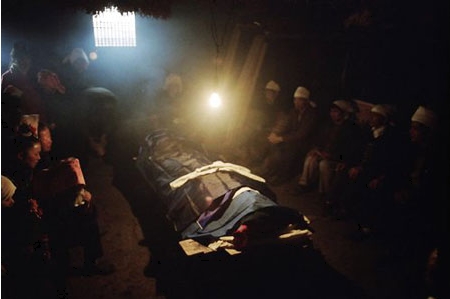
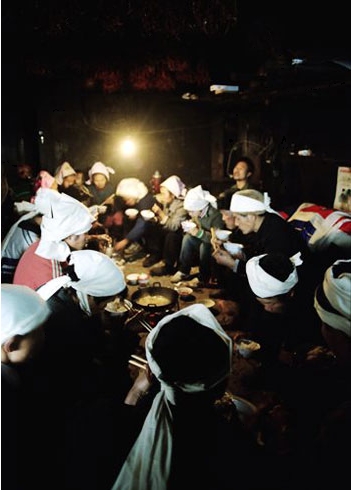
Once there is a family death all the mirrors in the home are immediately removed, it is believed if you see a coffin while looking in the mirror a death in the family will occur soon. A gong is placed outside of the home to the left of the entrance door if the deceased is male and for females is placed to the right, over the doorway a white sheet will be hung. The corpse will be dressed in their favorite outfit as long as it is not red, red clothing is believed to turn them into a ghost. Once they have been placed in the casket a light blue cloth will be used to cover the body and a yellow cloth will be placed over the face. Now that the corpse has been cleaned and dressed, the wake will now take place.
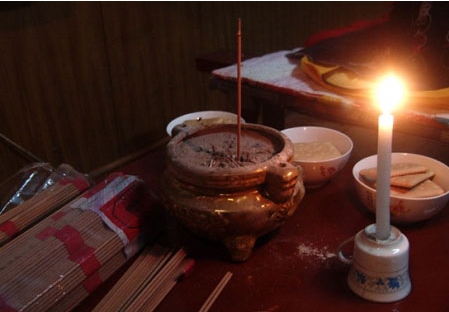
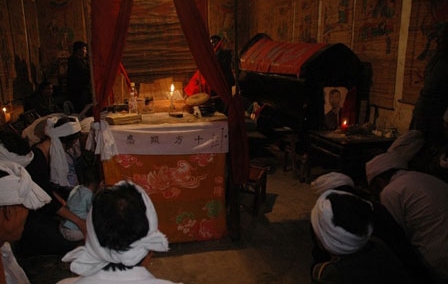
If the deceased died outside of their home the wake will take place in their courtyard, if they passed away at home it will take place inside the home. The head of the casket will be placed facing towards the inside of the home and it will rest upon stools approximately a foot off the ground. Around the head of the coffin photographs of the deceased are placed as well as wreaths and occasionally gifts. In front of the coffin will be a table with food, it is offered to the deceased. The family of the deceased will not wear the color red or wear jewelry to the wake. Red is considered the color of happiness and that is why it is avoided. While at the wake blood relatives will cry and mourn loudly for the deceased, the more inheritances the deceased left behind the louder their cries will be. The seating at the wake does correlate with family ranking. Family members will also wear special colored clothing during a Chinese wake to signify their rank in the family. Since they are considered to grieve the most, children and daughter in laws of the deceased will wear black. The grandchildren of the deceased will wear the color blue, great grandchildren wear light blue, son in law's since not considered immediate family are able to wear a less somber color. Hoods made out of sack cloth will be worn over the heads of the deceased's children. Relatives outside of the immediate family, upon arrival will crawl on their knees towards the casket.
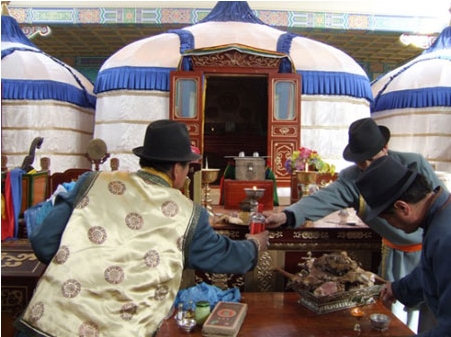
The length of a traditional Chinese wake is entirely dependent upon the family's fiscal situation; they will never be shorter than one full day. During the entire wake there will be prayer money and Joss paper burned. In Chinese culture they believe the prayer money that is burned will provide the deceased with their income in their next life. Incense will also be burnt at the altar; each person attending the wake will bow and light a stick of incense. At a traditional Chinese wake the lighting of the incense coupled with a monetary donation are done as a show of respect for the deceased's family. One of the most interesting customs at a traditional Chinese wake is that in the front yard of the home card games will be played. Tradition states that the body needs to be guarded and by them gambling it can help console them while keeping them alert and awake. At night during the wake period, there will be monks on site reciting Taoist or Buddhist scriptures. The chanting is often accompanied by light music, usually played from a flute. In Chinese culture it is often believed that once you pass away the sins you committed during life could affect your voyage to the afterlife. The monks are there to offer their spiritual wisdom to the deceased through prayers to help them transition to the other side.





